Christmas Play
Thank you for providing all of the wonderful costumes for our Christmas play.
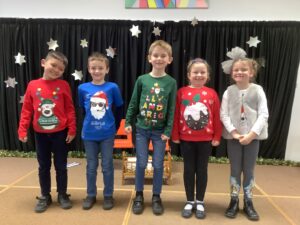
The narrators

Mary and Joseph
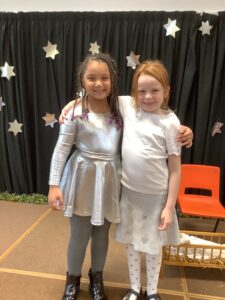
The stars
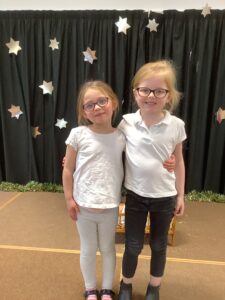
The servants
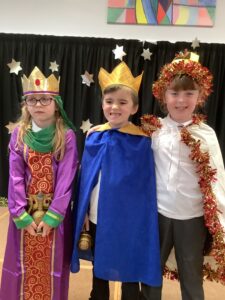
The kings
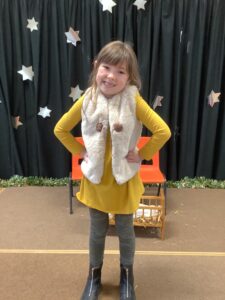
Humph the camel
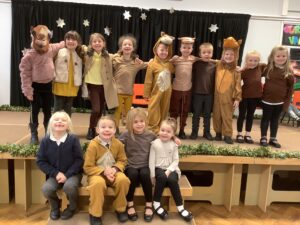
The camels
Week beginning 13 December 2021
We hope you’re managing to stay happy, healthy and safe while you’re not with us here in school. You are still very much a part of our school community so please get in touch with us if you need to.
Maths
Have a go at these maths lessons and worksheets.
- Lesson 1: video, worksheet, answers
- Lesson 2: video, worksheet, answers
- Lesson 3: video, worksheet, answers
- Lesson 4: video, worksheet, answers
- Lesson 5: watch the Supermovers video about counting in 5s and the 5 times table. Write down all the fives, as high as you can go (0, 5, 10, 15, 20, 25…).
- Lesson 6: video, worksheet, answers
- Lesson 7: video, worksheet, answers
- Lesson 8: video, worksheet, answers
- Lesson 9: video, worksheet, answers
- Lesson 10: video, worksheet, answers
You don’t have to print the worksheets. Your child can write or draw their answers on paper. Your child’s learning will be most effective if you sit with them to pause the clip and check / praise / support your child as the clip moves on.
Don’t forget to practise number bonds on Numbots or times tables on Times Table Rock Stars. Email your child’s class teacher if you need your login and password details.
(Suggested time: 30 minutes of Maths and 15 minutes of Numbots/Rock Stars daily)
Reading fluency
This is the reading fluency that we’ll read in class this week. In school, we generally follow this sequence:
- Day 1: Read the text aloud with your child listening. Read it clearly and slowly, pointing to each word as you read. Have a chat about any unfamiliar words.
- Day 2: Read aloud each sentence (a full short sentence or part of a longer sentence), and have your child read it back to you. Do this ‘echo reading’ for the whole text.
- Day 3: Read the text and talk about the effect of the punctuation on how you read it – pauses for full stops and expression for exclamations (!) or questions (?). Your child reads the text aloud.
- Day 4: Read together with expression (just like you practised on Day 3).
- Day 5: Your child reads independently and fluently.
(Suggested time: 15 minutes daily)
Phonics
We teach a phonics lesson daily at school. Your child should have a ‘Practise Phonics’ book that they bring home from school. The sticker on the front will indicate which phase they’re working at. On Phonics Play, the activities and games match the phases. If you’re unsure which phase your child is working on, email your class teacher.
If your child has completed the phonics reading books, they can use some Phase 5b, 5c, 5d or Phase 6 resources.
Use a different Phonics Play activity for :
- Revisit: Flashcard Speed Trial, Flashcard Time Challenge or Tricky Word Trucks
- Practise: Play Buried Treasure, Dragon’s Den or Picnic on Pluto
- Apply: Have a go reading one of the Comics or the Reading Robots
Login details are Sphere (user name) and Spher3 (password).
(Suggested time: 20 minutes daily)
Reading
We’ll be using this ’RIC’ text in class to practise comprehension skills.
RIC stands for:
- Retrieve: finding information in a text
- Interpret: using clues in the text or pictures to unlock information
- Choice: thinking about the author’s choice of words, techniques or organisation that make the text interesting and enjoyable to read
Read for 10-15 minutes daily. You could read the books you have brought home from school or any other books you have at home. Remember that the ‘Practise Phonics’ book is designed to be read more than once, to help with segmenting (sounding out), blending (putting the sounds back together) and fluency.
(Suggested time: 10-15 minutes daily)
Writing
These writing lessons all about non-chronological reports. There’s a whole series of lessons, but start at Lesson 1 and work through, doing one (or maybe even two) each day. (If you’re self-isolating in your second week, stick with the series of lessons you’ve already started and aim to complete the full series.)
(Suggested time: 30-40 minutes for each)
Spelling
This week’s spellings are on our spelling page. Complete one task each day:
- Day 1: Copy the words out in your best handwriting (like in our handwriting guide) – using a lead-in line or joined handwriting. (You could look out for the words in the book you’re reading at home, or any other text.)
- Day 2: Practise the spellings using two of the ideas in our super spelling strategies guide. (Set yourself and others at home a challenge of using some of the words when you’re speaking, too!)
- Day 3: Write separate sentences, each containing one of the spellings. (Don’t forget to show off really neat handwriting and make sure you sentence starts with a capital letter and ends with a full stop, exclamation mark (!) or question mark (?).
- Day 4: Repeat Task 2 or 3.
- Day 5: Get an adult at home to test you on your spellings. Practise any you spell incorrectly – you could write them out carefully until you’re sure.
(Suggested time: 15-20 minutes daily)
Topic
Our topic this half-term is art. Look at these lessons on printing. Or you can get creative using ideas from The Let’s Go Club on the BBC.
(Suggested time: 30-40 minutes)
Science
Our science lessons are all about investigating. Have a go at these six lessons. Start at Lesson 1 and work through, doing two or three in the week.
(Suggested time: 30-45 minutes)
PE
Don’t forget to do some daily exercise!
Do two of these Five Minute Moves from Joe Wicks each day – spread them across the day as if they were playtimes, maybe!
Have a go at one of the Change for Life indoor activities or a Cosmic Kids yoga session each day.
(Suggested time: 30 minutes daily)
Extra stuff…
As an extra (or as an alternative, if this helps to motivate your child)…
This sequence of lessons is all about The Nativity story.
Living and Learning is important to help us live and learn together. Here are some lesson from Oak National Academy called Forever Friends.
Week beginning 13 December 2021
We hope you’re managing to stay happy, healthy and safe while you’re not with us here in school. You are still very much a part of our school community so please get in touch with us if you need to.
Maths
Have a go at these maths lessons and worksheets.
- Lesson 1: video, worksheet, answers
- Lesson 2: video, worksheet, answers
- Lesson 3: video, worksheet, answers
- Lesson 4: watch the Supermovers video about counting in 2s and the 2 times table. Write down all the twos, as high as you can go (0, 5, 10, 15, 20, 25…). Challenge : write the 2 times table facts.
- Lesson 5: watch the Supermovers video about counting in 5s and the 5 times table. Write down all the fives, as high as you can go (0, 5, 10, 15, 20, 25…). Challenge : write the 5 times table facts.
- Lesson 6: video, worksheet, answers
- Lesson 7: video, worksheet, answers
- Lesson 8: video, worksheet, answers
- Lesson 9: video, worksheet, answers
- Lesson 10: video and activities
You don’t have to print the worksheets. Your child can write or draw their answers on paper. Your child’s learning will be most effective if you sit with them to pause the clip and check / praise / support your child as the clip moves on.
Don’t forget to practise number bonds on Numbots or times tables on Times Table Rock Stars. Email your child’s class teacher if you need your login and password details.
(Suggested time: 30 minutes of Maths and 15 minutes of Numbots/Rock Stars daily)
Reading fluency
This is the reading fluency that we’ll read in class this week. In school, we generally follow this sequence:
- Day 1: Read the text aloud with your child listening. Read it clearly and slowly, pointing to each word as you read. Have a chat about any unfamiliar words.
- Day 2: Read aloud each sentence (a full short sentence or part of a longer sentence), and have your child read it back to you. Do this ‘echo reading’ for the whole text.
- Day 3: Read the text and talk about the effect of the punctuation on how you read it – pauses for full stops and expression for exclamations (!) or questions (?). Your child reads the text aloud.
- Day 4: Read together with expression (just like you practised on Day 3).
- Day 5: Your child reads independently and fluently.
(Suggested time: 15 minutes daily)
Phonics
We teach a phonics lesson daily at school. Your child should have a ‘Practise Phonics’ book that they bring home from school. The sticker on the front will indicate which phase they’re working at. On Phonics Play, the activities and games match the phases. If you’re unsure which phase your child is working on, email your class teacher.
If your child has completed the phonics reading books, they can use some Phase 5b, 5c, 5d or Phase 6 resources.
Use a different Phonics Play activity for :
- Revisit: Flashcard Speed Trial, Flashcard Time Challenge or Tricky Word Trucks
- Practise: Play Buried Treasure, Dragon’s Den or Picnic on Pluto
- Apply: Have a go reading one of the Comics or the Reading Robots
Login details are Sphere (user name) and Spher3 (password).
(Suggested time: 20 minutes daily)
Reading
We’ll be using this ’RIC’ text in class to practise comprehension skills.
RIC stands for:
- Retrieve: finding information in a text
- Interpret: using clues in the text or pictures to unlock information
- Choice: thinking about the author’s choice of words, techniques or organisation that make the text interesting and enjoyable to read
Read for 10-15 minutes daily. You could read the books you have brought home from school or any other books you have at home. Remember that the ‘Practise Phonics’ book is designed to be read more than once, to help with segmenting (sounding out), blending (putting the sounds back together) and fluency.
(Suggested time: 10-15 minutes daily)
Writing
These writing lessons all about non-chronological reports. There’s a whole series of lessons, but start at Lesson 1 and work through, doing one (or maybe even two) each day. (If you’re self-isolating in your second week, stick with the series of lessons you’ve already started and aim to complete the full series.)
(Suggested time: 30-40 minutes for each)
Spelling
This week’s spellings are on our spelling page. Complete one task each day:
- Day 1: Copy the words out in your best handwriting (like in our handwriting guide) – using a lead-in line or joined handwriting. (You could look out for the words in the book you’re reading at home, or any other text.)
- Day 2: Practise the spellings using two of the ideas in our super spelling strategies guide. (Set yourself and others at home a challenge of using some of the words when you’re speaking, too!)
- Day 3: Write separate sentences, each containing one of the spellings. (Don’t forget to show off really neat handwriting and make sure you sentence starts with a capital letter and ends with a full stop, exclamation mark (!) or question mark (?).
- Day 4: Repeat Task 2 or 3.
- Day 5: Get an adult at home to test you on your spellings. Practise any you spell incorrectly – you could write them out carefully until you’re sure.
(Suggested time: 15-20 minutes daily)
Topic
Our topic this half-term is art. Look at these lessons on printing. Or you can get creative using ideas from The Let’s Go Club on the BBC.
(Suggested time: 30-40 minutes)
Science
Our science lessons are all about investigating. Have a go at these six lessons. Start at Lesson 1 and work through, doing two or three in the week.
(Suggested time: 30-45 minutes)
PE
Don’t forget to do some daily exercise!
Do two of these Five Minute Moves from Joe Wicks each day – spread them across the day as if they were playtimes, maybe!
Have a go at one of the Change for Life indoor activities or a Cosmic Kids yoga session each day.
(Suggested time: 30 minutes daily)
Extra stuff…
As an extra (or as an alternative, if this helps to motivate your child)…
This sequence of lessons is all about The Nativity story.
Living and Learning is important to help us live and learn together. Here are some lesson from Oak National Academy called Forever Friends.
Christingle
This week, the children enjoyed making their own Christingle. We spoke about the meaning of it.
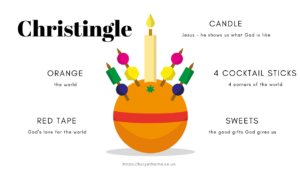
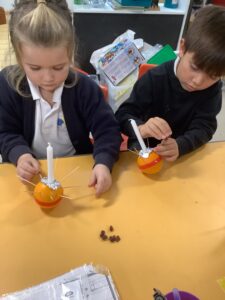
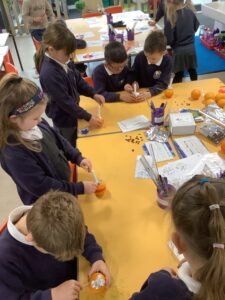

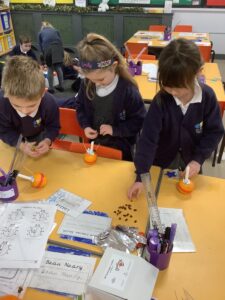
We walked to church on Thursday for the Christingle Service. Some of the children read The Christmas Giving by Iris W Bray and then we all held our Christingle as they were lit. We spoke about how we had to be very careful while doing this.
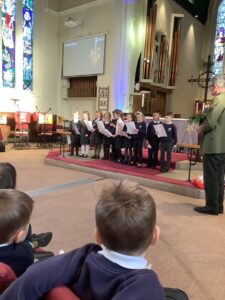
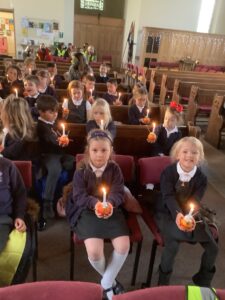

This week’s message (Friday 10 December 2021)
This week’s message has a couple of reminders, but we start with a ‘Plan B’ update on Covid precautions…
Since the early days of the pandemic, the Department for Education has been sending regular emails to schools. Yesterday’s came with an introductory sentence: ‘Today’s email includes an urgent update for all education and childcare settings on implementing Plan B of the COVID-19 Response: Autumn and Winter Plan’. Here are some extracts:
school attendance remains mandatory and all the usual rules continue to apply
settings are strongly encouraged to ask parents, guardians and other visitors to take a lateral flow device (LFD) test before entering the setting
all staff and students should test over the holidays in line with national guidance. This means that they should test if they will be in a high-risk situation that day and before visiting people who are at higher risk of severe illness if they get COVID-19
We were also asked to ‘revisit…existing outbreak plans to ensure [we] are well prepared for any future changes’ – let’s hope we don’t get to the same situation as we were in last January.
Next, a couple of reminders…
Next Tuesday, learning updates will be sent home. These are short reports that we send home at the end of the Autumn and Spring terms; they complement the parent-teacher meetings which take place earlier in the same terms. We started doing these a few years ago following your feedback in our annual surveys.
Also coming up next week is a non-uniform day on your child’s party day. Our Uniform Policy contains the following:
Pupils should dress appropriately and respectfully for school, even on non-uniform days. Clothes are inappropriate if they, for example, glorify violence, feature bad language, are very short (eg crop tops), or relate to age-inappropriate topics (eg computer games)… Make-up (other than face paints as part of a specific costume) is not allowed. Flip-flops or high-heeled shoes are not allowed, even on non-uniform days, because they’re dangerous when running.
Have a happy and healthy weekend.
Christmas production and Christingle
The Christmas production is live!
Make sure you scroll down our class news page to watch it. Well done to all the Reception children. You really were the STARS of the show!
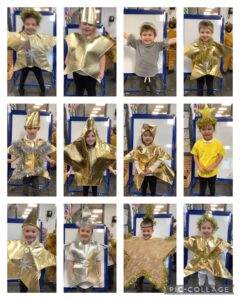
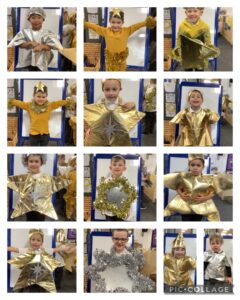 Christingle
Christingle
On Tuesday, we made our Christingles. We talked about the different parts and what they mean.
The orange represents the world.
The candle represents Jesus being the light of the world.
The raisins represent God’s creations in the four seasons.
The red tape represents the blood of Jesus when he died on the cross.
The children were fantastic at following instructions when making their own Christingles.
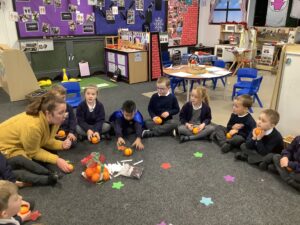
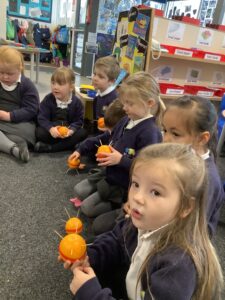
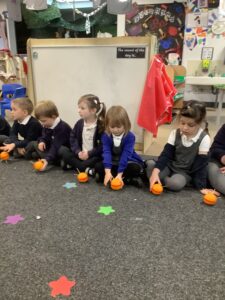
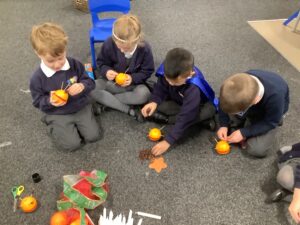
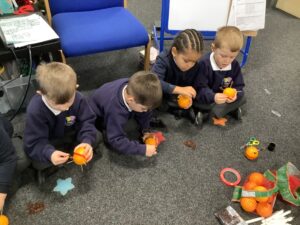
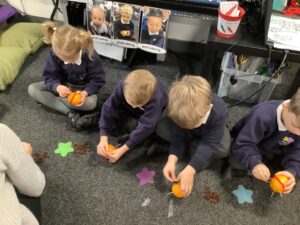
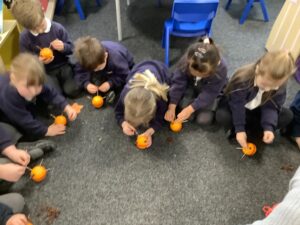
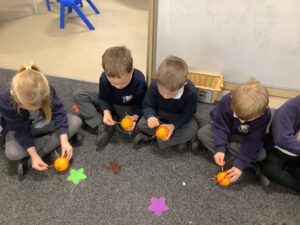
Yesterday, we walked to St James’ Parish Church to join the rest of the school at the Christingle service. You wouldn’t;t have thought it was their first time because they were all so sensible – well done Reception! A big thank you to the four Reception parents that helped us get there and back in one piece.
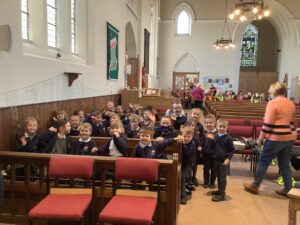
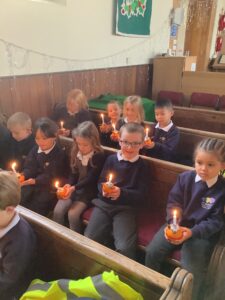
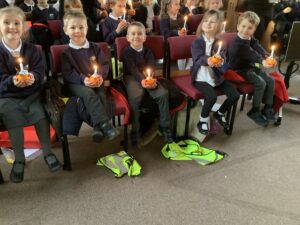
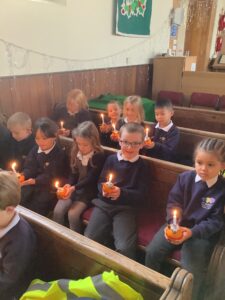
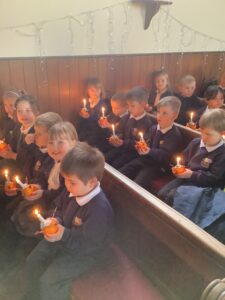
Talk to your child about the Christingle service and see if they can remember the meaning.
Next week…
Wednesday 15 December
Christmas party day
Your child can wear non-uniform.
&
Christmas dinner day
Your child will be bringing home lots of lovely Christmas things on Wednesday. Please make sure your child brings a labelled carrier bag by Wednesday 15 December.
Home-Link Challenge
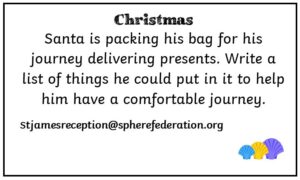
Have a lovely weekend! See you next week for a jam-packed fun Christmas week.
10 December 2021
Next week, we’ll continue to focus on common homophones. Homophones are words that sound the same but are spelled differently and have different meanings – this is one of the reasons why English spelling is super tricky!
To help consolidate this learning, we’d like you to practise spelling these words at home. Because they’re homophones, it’s most useful to practise these in sentences. You could do this in the car, on a walk or around the table.
hear, here, which, witch, to, two, too,
I can hear a tune. Come and sit here.
Which shoes shall I wear? I saw a witch with a broomstick.
I am going to the shop to buy two lollies. Do you want to come too?
We’ll test ourselves on Friday 17 December to see how we’ve got on.
For some tips and tricks on how best to practise your spellings at home, visit the Y3,4 spelling page on our website and click here.
10 December 2021
Write the word then trace it with your finger or pencil, saying the word. Cover it and write underneath, saying the word again.
Year 1:
of once one our pull
Year 2:
was we were where you your who what when well
10 December 2021
This week we have been studying homophones. Learn the following words for a test on Thursday 17th December.
- isle
- aisle
- aloud
- allowed
- herd
- heard
- affect
- effect
- past
- passed
10 December 2021
Living and learning is the theme for this week’s Talk Time.
I can talk through a ‘recipe’ for how to be a good friend.
Being a good friend requires a number of key ingredients. When discussing how to be a good friend, think about the qualities that you have and that you value in your friends, too. How many adjectives can you come up with to describe a good friend?
This week’s Remember 2s provide some useful top tips for being a good friend:
- A good friend is someone that you can have fun with and makes you feel good about yourself.
- You don’t need to spend all of your time with one person to be a good friend.
- Your friend might not always agree with you but they will still respect your opinions.
One of the qualities in your good friend recipe is likely to link to honesty.
Discuss and come up with as many reasons why telling the truth is important.
For the second part of this Talk Time, come up with a list of reasons why telling the truth is important.
Think about a time when someone didn’t tell you the truth. How did that make you feel? Even if the truth might not be what you want to hear, is it better to hear the truth than it is to hear a lie?